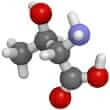Background
- Threonine is an important amino acid that is a building block for proteins in the body. Some foods that are high in L-threonine are cottage cheese, watercress, sesame seeds, soy, meat and fish, lentils, eggs, milk, and gelatin.
- L-threonine has been studied in the treatment of nerve disorders like amyotrophic lateral sclerosis (ALS), multiple sclerosis, and muscle spasms. However, more research is needed.
References
- Blin, O, Desnuelle, C, Guelton, C, et al. [Anomaly in the neurotransmitter amino acids in amyotrophic lateral sclerosis: a therapeutic application]. Rev.Neurol.(Paris) 1991;147(5):392-394. View Abstract
- Blin, O, Pouget, J, Aubrespy, G, et al. A double-blind placebo-controlled trial of L-threonine in amyotrophic lateral sclerosis. J.Neurol. 1992;239(2):79-81. View Abstract
- Borgonha, S, Regan, MM, Oh, SH, et al. Threonine requirement of healthy adults, derived with a 24-h indicator amino acid balance technique. Am.J.Clin.Nutr. 2002;75(4):698-704. View Abstract
- Bromberg, MB, Fries, TJ, Forshew, DA, et al. Electrophysiologic endpoint measures in a multicenter ALS drug trial. J.Neurol.Sci. 2-15-2001;184(1):51-55. View Abstract
- Dong, X, Quinn, PJ, and Wang, X. Metabolic engineering of Escherichia coli and Corynebacterium glutamicum for the production of L-threonine. Biotechnol.Adv. 2011;29(1):11-23. View Abstract
- Godard, MP, Williamson, DL, and Trappe, SW. Oral amino-acid provision does not affect muscle strength or size gains in older men. Med.Sci.Sports Exerc. 2002;34(7):1126-1131. View Abstract
- Hauser, SL, Doolittle, TH, Lopez-Bresnahan, M, et al. An antispasticity effect of threonine in multiple sclerosis. Arch.Neurol. 1992;49(9):923-926. View Abstract
- Hsieh JTC, Wolfe DL, Connolly S, et al. Spasticity after spinal cord injury: an evidence-based review of current interventions. Topics in Spinal Cord Injury Rehabilitation (TOP SPINAL CORD INJ REHABIL) 2007;13(1):81-97.
- Lee, A and Patterson, V. A double-blind study of L-threonine in patients with spinal spasticity. Acta Neurol.Scand. 1993;88(5):334-338. View Abstract
- Parton, M, Mitsumoto, H, and Leigh, PN. WITHDRAWN: Amino acids for amyotrophic lateral sclerosis / motor neuron disease. Cochrane.Database.Syst.Rev. 2008;(2):CD003457. View Abstract
- Rochon, C, Prod'homme, M, Laurichesse, H, et al. Effect of medroxyprogesterone acetate on the efficiency of an oral protein-rich nutritional support in HIV-infected patients. Reprod.Nutr.Dev. 2003;43(2):203-214. View Abstract
- Shakespeare, DT, Boggild, M, and Young, C. Anti-spasticity agents for multiple sclerosis. Cochrane.Database.Syst.Rev. 2003;(4):CD001332. View Abstract
- Testa, D, Caraceni, T, Fetoni, V, et al. Chronic treatment with L-threonine in amyotrophic lateral sclerosis: a pilot study. Clin.Neurol.Neurosurg. 1992;94(1):7-9. View Abstract
- van der Schoor, SR, Wattimena, DL, Huijmans, J, et al. The gut takes nearly all: threonine kinetics in infants. Am.J.Clin.Nutr. 2007;86(4):1132-1138. View Abstract
- Wilson, DC, Rafii, M, Ball, RO, et al. Threonine requirement of young men determined by indicator amino acid oxidation with use of L-[1-(13)C]phenylalanine. Am.J.Clin.Nutr. 2000;71(3):757-764. View Abstract







